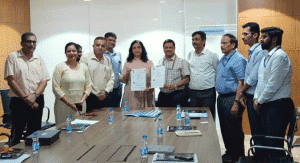“India’s broader vision for sustainable transportation is well-aligned with the Water Metro project. The government is committed to promoting sustainable and environment-friendly modes of transportation, and the Water Metro project is a significant step in this direction,” says Dr. M. P. RAMNAVAS, Director (Projects), Kochi Metro Rail Ltd. in a conversation with Geospatial World.
Could you provide more insights into the Water Metro project in India and how it aligns with India’s broader vision?
The Water Metro Project is a state-of-the-art water transport system that mirrors the facilities provided by traditional metro rail systems. It connects ten islands to the mainland in Kochi, boasting fifteen distinct routes. In line with our phase one plan, we’ve already commissioned 78 boats and 38 terminals, covering a route of 76 kilometres. This system officially commenced operations on April 25th, 2023, and has received a highly positive response from the public. It has proven to be incredibly convenient for commuters travelling between the islands and the mainland, significantly reducing their travel hassles.
India’s broader vision for sustainable transportation is well-aligned with the Water Metro project. The government is committed to promoting sustainable and environment-friendly modes of transportation, and the Water Metro project is a significant step in this direction. The project is also helping to decongest roads and reduce traffic congestion, which is a major problem in many Indian cities.
Can you elaborate on the vision behind this sustainability effort and whether upcoming projects in India will follow a similar environmentally conscious approach?
By incorporating electric batteries in our boats, we have significantly reduced our environmental footprint. Our system operates primarily on renewable energy, with diesel being used only in emergency situations. While we are not currently utilizing solar power, we do have plans to implement solar plants to achieve energy neutrality.
We firmly believe that this environmentally friendly approach can be extended to other cities and towns, not only in Kerala but across India and even abroad. The positive reception from the international maritime community, including the International Maritime Organization, has been highly encouraging.
Upcoming projects in India are also incorporating sustainable and environmentally conscious approaches. For example, the Delhi Metro Rail Corporation is planning to develop a “green metro” corridor that will use solar energy to power its trains and stations. The Mumbai Metro Rail Corporation is also exploring the use of renewable energy to power its system.
With such an extensive water transport network, have you considered the impact on aquatic and marine ecosystems, and what measures have been taken to minimize any adverse effects?
The Water Metro system has been designed with great consideration for the environment. Our boats, powered by batteries, produce minimal noise pollution, and their low weight wash design creates minimal ripples in the water.
As a result, the system has a minimal impact on the aquatic ecosystem and coastal areas. Compared to other forms of water transport, the Water Metro system actually reduces its impact on the environment, providing several benefits.
We have also taken several measures to minimize any adverse effects on the environment. For example, we have established a comprehensive environmental monitoring program to track the impact of the system on the aquatic ecosystem. We are also working with local communities and environmental groups to ensure that the system is operated in a sustainable manner.
Please shed light on the long-term financial implications of renewable shift and where you see the value in investing in it?
Transitioning to renewable energy sources may initially come with higher costs, but over time, technology advancements and the numerous advantages of adopting renewable energy sources outweigh these initial expenses.
It’s essential to consider the long-term benefits and environmental impact when evaluating the value of such investments. Renewable energy sources offer a number of long-term financial benefits like reducing energy costs. We firmly believe that this environmentally friendly approach can be extended to other cities and towns, not only in Kerala but across India and even abroad.










